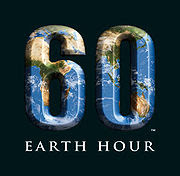 Earth Hour is an annual international event created by the WWF (World Wide Fund for Nature/World Wildlife Fund), held on the last Saturday of March, that asks households and businesses to turn off their non-essential lights and electrical appliances for one hour to raise awareness towards the need to take action on climate change. It was pioneered by WWF Australia and the Sydney Morning Herald in 2007, and achieved worldwide participation in 2008. Earth Hour 2009 is 8:30–9:30 March 28 2009. Currently, 82 countries and more than 2100 cities are 'committed to Earth Hour 2009', a huge increase from people participating in 35 countries for Earth Hour 2008. 1 billion 'votes' is the stated aim for Earth Hour 2009, in the context of the pivotal 2009 United Nations Climate Change Conference.
Earth Hour is an annual international event created by the WWF (World Wide Fund for Nature/World Wildlife Fund), held on the last Saturday of March, that asks households and businesses to turn off their non-essential lights and electrical appliances for one hour to raise awareness towards the need to take action on climate change. It was pioneered by WWF Australia and the Sydney Morning Herald in 2007, and achieved worldwide participation in 2008. Earth Hour 2009 is 8:30–9:30 March 28 2009. Currently, 82 countries and more than 2100 cities are 'committed to Earth Hour 2009', a huge increase from people participating in 35 countries for Earth Hour 2008. 1 billion 'votes' is the stated aim for Earth Hour 2009, in the context of the pivotal 2009 United Nations Climate Change Conference.Energy saved
According to WWF Thailand, Bangkok decreased electricity usage by 73.34 megawatts, which, over one hour, is equivalent to 41.6 tonnes of carbon dioxide. The Bangkok Post gave different figures of 165 megawatt-hours and 102 tonnes of carbon dioxide. This was noted to be significantly less than a similar campaign initiated by Bangkok's City Hall the previous year in May where 530 megawatt-hours were saved and 143 tonnes of carbon dioxide emission was cut. Toronto saved 900 megawatt-hours of electricity. 8.7% was saved if measured against a typical March Saturday night. Ireland, as a whole, had a reduction in electricity use of about 1.5% for the evening. In the three-hour period between 18:30 and 21:30, there was a reduction of 50 megawatts, saving 150 megawatt-hours, or approximately 6 tonnes of carbon dioxide.
In Dubai, where external lighting on several major city landmarks was turned off and street lighting in selected areas was dimmed by 50%, the Electricity and Water Authority reported savings of 100 megawatt-hours of electricity. This represented a 2.4% reduction in demand compared to before the hour began.
The worst result was from Calgary, Canada. The city's power consumption actually went up 3.6% at the hour's peak electricity demand. In Calgary, however, where weather plays a large role in power consumption, the city experienced weather 12°C colder than the previous Saturday's recorded temperature.
No comments:
Post a Comment